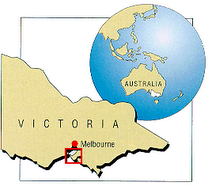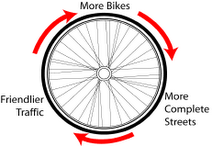
Have we really sat down and weighed the damage we humans do with cars over the benefits they have brought?
I challenge anyone to show that mankind is better off because we have a 2 tonne lump of steel in our driveway for personal mobility and convenience.
Most trips we do with these dinosaurs can be done with a better outcome for us and our planet by alternative sustainable means ( just think if next time Joe Suburban wants a chocolate chip ice cream Joe actually did a walk to the shop to get it instead of driving the 300-500m). hey!! even ride to work, Joe's sizable butt may disappear, the Joe fuel bill will drop to near zero and Joe's time will be better spent getting healthy instead of fat in a 4 wheeled cocoon stuck in a polluting gridlocked line of metal coffins there and back.
Better still if Joe sold thecar/s Joe would save a fortune in household running costs, use the money for a great holiday, some continuing education for Joe's self or partner, even donate some of it to educate a child in poverty or even plan a better retirement plan... look at what Joe pays each year in car registration and insurances, plus fuels and repairs. In Australia that is about $250 per week for the average family car according to Choice. Can we really afford to keep up this madness... I said here that business as usual can't go on...
OK in Portland Oregon at the moment is the Car free Cities Conference, details are here.
This is part of the activity of the World Car Free Network.
They have been telling us for years that motors cars as personal mobility tools are absurd and there are better alternatives.
On their resources page are heaps of links to research papers on point. I ask you do yourself a favour and have a look.

Some of the choicer items I reproduce below, as I know some of you may not want to follow the links just now... but they are too important to ignore.
Here we go:
American Ground Transport 
by Bradford C. Snell, 1974
This proposal for restructuring the automobile, truck, bus and rail industries stemming from the original 1974 U.S. Government Report, looks at social consequences of monopoly. It shows that excessive economic concentration can restructure society for corporate ends. As an illustration, it describes how General Motors, Ford and Chrysler reshaped American ground transportation to serve corporate wants instead of social needs. The study concludes with a discussion of feasibility and a review of alternative means of implementation. It suggests, for instance, that reorganization into smaller, independently competing units is feasible for at least two reasons: America's ground vehicle industries performed better when they were independent and less concentrated; and the more advanced transport industries of Europe and Japan are largely organized in this fashion. (LINK to ENG HTML)

by Bradford C. Snell, 1974
This proposal for restructuring the automobile, truck, bus and rail industries stemming from the original 1974 U.S. Government Report, looks at social consequences of monopoly. It shows that excessive economic concentration can restructure society for corporate ends. As an illustration, it describes how General Motors, Ford and Chrysler reshaped American ground transportation to serve corporate wants instead of social needs. The study concludes with a discussion of feasibility and a review of alternative means of implementation. It suggests, for instance, that reorganization into smaller, independently competing units is feasible for at least two reasons: America's ground vehicle industries performed better when they were independent and less concentrated; and the more advanced transport industries of Europe and Japan are largely organized in this fashion. (LINK to ENG HTML)
Freesources
compiled byWorld Carfree Network's International Coordination Centre
ON CARFREE DEVELOPMENT

Car-Free Development
(Module 3e of the "Sourcebook for Policy-Makers in Developing Cities," by Lloyd Wright, GTZ, 2005)
More than 170 pages covering a range of issues around car-free development, including an overview of worldwide car-free activities (e.g. car-free days, car-free housing, large-scale pedestrianisation), an outline of project implementation processes and a listing of car-free resources, including information resources and funding opportunities. This document has been developed under GTZ's Sustainable Urban Transport Project and is part of the "Sustainable Urban Transport Sourcebook for Policymakers in Developing Cities." This and all other - at present - 22 modules of the Sourcebook are available from the GTZ SUTP project website at http://www.sutp.org/ after a quick registration process.[PDF, 16MB]
Car-Free Housing in European Cities
(A Survey of Sustainable Residential Development Projects, by Jan Scheurer, ISTP, 2000
This research on carfree and car-lite housing development was part of a PhD project investigating the contribution urban ecology, community and mobility management innovations in residential neighbourhoods can make towards the sustainable transformation of our cities. The paper looks at projects in Amsterdam, Edinburgh, Hamburg, Vienna, Freiburg and Cologne.[HTML, external link]
HOW-TO GUIDES
Action Ideas
by World Carfree Network
Originally compiled as a list of suggested actions for World Carfree Day 2000, this list includes many suggestions which are easily and readily adaptable for anyone who wants to fight car culture. Ranging from activist to family-fun oriented, with ideas for those working alone or in groups, this list remains a great resource and a compilation of some of the best actions we have yeat heard of as well as the newest suggestions.[English - HTML]
An Activist's Guide to Exploiting the Media
by George Monbiot
The only chance we have of reaching people who haven't yet heard what we've got to say is through the media. Whether we use the media or not, our opponents will, says the author of this witty and useful booklet. He then briefly presents the media people and their life problems, and sums up our advantages. In four lessons he teaches you how to invite the press to your actions, how to organise the events so they can be media-covered, how to give interviews and what to do after you've done all this. In one word, a handy step-by-step manual that will turn you into a media star practically overnight![English - HTML]
(A Survey of Sustainable Residential Development Projects, by Jan Scheurer, ISTP, 2000
This research on carfree and car-lite housing development was part of a PhD project investigating the contribution urban ecology, community and mobility management innovations in residential neighbourhoods can make towards the sustainable transformation of our cities. The paper looks at projects in Amsterdam, Edinburgh, Hamburg, Vienna, Freiburg and Cologne.[HTML, external link]
HOW-TO GUIDES
Action Ideas

by World Carfree Network
Originally compiled as a list of suggested actions for World Carfree Day 2000, this list includes many suggestions which are easily and readily adaptable for anyone who wants to fight car culture. Ranging from activist to family-fun oriented, with ideas for those working alone or in groups, this list remains a great resource and a compilation of some of the best actions we have yeat heard of as well as the newest suggestions.[English - HTML]
An Activist's Guide to Exploiting the Media
by George Monbiot
The only chance we have of reaching people who haven't yet heard what we've got to say is through the media. Whether we use the media or not, our opponents will, says the author of this witty and useful booklet. He then briefly presents the media people and their life problems, and sums up our advantages. In four lessons he teaches you how to invite the press to your actions, how to organise the events so they can be media-covered, how to give interviews and what to do after you've done all this. In one word, a handy step-by-step manual that will turn you into a media star practically overnight![English - HTML]
The Bluffer's Guide to Conference Organising
by Car Busters & Tinerii Prieteni ai Naturii, 2000
Culled from our experiences in organising Towards Car Free Cities II, held in Romania, April 2000. Includes information on how to chose a venue, get payment, organise actions and much, much more.[English - HTML]
Depaving the World
by Richard Register
A cute little how-to for those of us who feel strong enough in the muscles department. Register prompts us not to waste time anymore and do what the road builders always fail to do - to depave what doesn't have to be paved. Treating small depaving projects, medium-sized projects and depaving for the ambitious separately, he gives a concise lesson on how to actually do the hard work, where to get the tools and where to haul all the black shite you dig out. Marvellous for activists who are not afraid to put on a fake 'Public Works' costume and dig for the 'black gold' that's buried in every street! "Start small, think big. Think it through, then swing that pick."[English - HTML]
Pour en finir avec la société de l'automobile

by Marcel Robert, Carfree France, September 2005
"Marcel Robert nous montre que le choix de vivre sans voiture peut e^tre fait aussi bien au niveau collectif qu’individuel. Ces choix deviennent urgents au fur et a` mesure que nous mesurons les conséquences de nos modes de vie sur notre environnement. La question n’est plus de savoir si ces choix doivent e^tre pris, mais quand nous aurons enfin le courage de les prendre."The book is also available on-line at Carfree France. [French - PDF, 0.8MB]
Road Raging: Top Tips for Wrecking Roadbuilding
by Road Alert!, March 1997
The out-of-print road fighter’s bible, with 17 chapters filled with solid, practical information on everything from writing press releases and organising affinity groups to building tree camps and digging tunnels. Written by Road Alert in 1997. This text version lacks the valuable diagrams that accompany the tripod and tree camp sections.The book is also available on-line at http://www.eco-action.org/rr/. [English - HTML]
Kathimerini,
an Athens-based English-language newspaper.
http://www.ekathimerini.com/4dcgi/_w_articles_ell_1657623_24/04/2004_42096
-->
THOUGHT PIECES
http://www.ekathimerini.com/4dcgi/_w_articles_ell_1657623_24/04/2004_42096
-->
THOUGHT PIECES
The Automobile and Décroissance
by Denis Cheynet
Although they have been revealed many times over, the misdeeds of the automobile are never truly heard and absorbed, and their exposure is stifled by an ideology that absolutely does not want to hear about them. In a world that professes to be rational and logical, the car is the most emotional and the most aberrant tool there is. Automobile growth cannot be sustained in the long-term and is also not even feasible in the present, due to the fact that only a privileged minority of humankind benefits from its economic development. If we would like that life be possible on Earth in the decades to come, our only solution is to thus abandon this scourge. At the same time, we must put into question, in a deep and radical manner, the causes which have made the car ideology dominant in industrialized countries. The elimination of the automobile should be effected by reducing our consumption of materials and natural resources, reducing the transportation flow, and a re-evaluation of our goals.
by Denis Cheynet
Although they have been revealed many times over, the misdeeds of the automobile are never truly heard and absorbed, and their exposure is stifled by an ideology that absolutely does not want to hear about them. In a world that professes to be rational and logical, the car is the most emotional and the most aberrant tool there is. Automobile growth cannot be sustained in the long-term and is also not even feasible in the present, due to the fact that only a privileged minority of humankind benefits from its economic development. If we would like that life be possible on Earth in the decades to come, our only solution is to thus abandon this scourge. At the same time, we must put into question, in a deep and radical manner, the causes which have made the car ideology dominant in industrialized countries. The elimination of the automobile should be effected by reducing our consumption of materials and natural resources, reducing the transportation flow, and a re-evaluation of our goals.
AUTOSTOP
by Ivan Illich and Jean Robert, 1992
Based on quite accurate observation of the damaging impacts of current transportation and with regard to the historical development of the transportation industry, this study proposes a new way of using private cars. Every car with a free seat must stop when asked. A law restricts licenses to drivers who produce passenger-miles and earn income by doing so. Everyone who is not a driver will be chauffeured, and all drivers are available as chauffeurs. Can a simple judicial judgment turn the way we now think about economic "goods" topsy turvy? Without any technical innovation, can a society transform its social and physical environment? Can a small change in the character of transportation lead to a moral reevaluation of place?[English - HTML][Deutsch - HTML]
by Ivan Illich and Jean Robert, 1992

Based on quite accurate observation of the damaging impacts of current transportation and with regard to the historical development of the transportation industry, this study proposes a new way of using private cars. Every car with a free seat must stop when asked. A law restricts licenses to drivers who produce passenger-miles and earn income by doing so. Everyone who is not a driver will be chauffeured, and all drivers are available as chauffeurs. Can a simple judicial judgment turn the way we now think about economic "goods" topsy turvy? Without any technical innovation, can a society transform its social and physical environment? Can a small change in the character of transportation lead to a moral reevaluation of place?[English - HTML][Deutsch - HTML]
Car Culture and the Landscape of Subtraction
by Philip Goff, 199?
A little frightening piece of writing to remind us that what used to belong to the public to enjoy has turned into car roadways. Hand in hand with the auto industry, modernist urban planners and architects, dehumanised traffic engineers, and demagogue developers are seen guilty for this negative development. Many of humanity's most pressing problems can be traced to the overuse of automobiles, and unchecked suburban development. Until something in human behaviour is curbed, our decadent lifestyle will continue to decimate communities and cities, and precipitate the ongoing destruction of the natural world.[English - HTML]
Dirty from Cradle to Grave
by John Whitelegg, 1993
Only 40 percent of an average car's air pollution is emitted during the car's "driving" life stage. The other 60 percent results from other life stages: the extraction of raw materials, the transport of raw materials, the production of the car, and the disposal of the car. Cars emit 56 percent of their pollution before they ever hit the road, and 4 percent after they are retired. Thus efforts to decrease air pollution by getting "old, polluting" cars off the road to only replace them with new, "cleaner" cars are misguided - as such efforts have focused on pollution emitted solely during the driving stage and thus have missed 60 percent of the problem. We advocate an end to the production of new cars, an end to road building, and also to take existing cars off the roads in favor of walking, bicycling, and tram and train use.[English - RTF, 4KB]
by John Whitelegg, 1993
Only 40 percent of an average car's air pollution is emitted during the car's "driving" life stage. The other 60 percent results from other life stages: the extraction of raw materials, the transport of raw materials, the production of the car, and the disposal of the car. Cars emit 56 percent of their pollution before they ever hit the road, and 4 percent after they are retired. Thus efforts to decrease air pollution by getting "old, polluting" cars off the road to only replace them with new, "cleaner" cars are misguided - as such efforts have focused on pollution emitted solely during the driving stage and thus have missed 60 percent of the problem. We advocate an end to the production of new cars, an end to road building, and also to take existing cars off the roads in favor of walking, bicycling, and tram and train use.[English - RTF, 4KB]
The Elephant in the Bedroom
by Stanley I. Hart and Alvin L. Spivak, 1992
The Elephant in the Bedroom (The one thing we must do to save the earth) is a book on-line. It describes "the condition of society and the economy as affected by our dependence on the automobile. Dependence created by heavy subsidies: parking, operating space, costs to local government."[English - HTML]
by Stanley I. Hart and Alvin L. Spivak, 1992
The Elephant in the Bedroom (The one thing we must do to save the earth) is a book on-line. It describes "the condition of society and the economy as affected by our dependence on the automobile. Dependence created by heavy subsidies: parking, operating space, costs to local government."[English - HTML]
Energy And Equity
by Ivan Illich, 1974
Ivan Illich’s brilliant, classic, mind-blowing essay argues (among other things) that high speed is the critical factor that makes transportation socially destructive, that we have become dangerously overpowered by our technology. He calls for a society based around low-speed transport, having found that, at speeds faster than 15 mph, equity declines, the scarcity of both time and space increases, and the human and natural environment are degraded. Illich thus finds a contradiction implicit in the joint pursuit of equity and industrial growth.[English - HTML]
by Ivan Illich, 1974
Ivan Illich’s brilliant, classic, mind-blowing essay argues (among other things) that high speed is the critical factor that makes transportation socially destructive, that we have become dangerously overpowered by our technology. He calls for a society based around low-speed transport, having found that, at speeds faster than 15 mph, equity declines, the scarcity of both time and space increases, and the human and natural environment are degraded. Illich thus finds a contradiction implicit in the joint pursuit of equity and industrial growth.[English - HTML]
Hypermobility
by John Adams, 2000
Mobility is liberating and empowering, Adams argues. But you can have too much of a good thing. Adams maintains that society will be more dispersed, polarised and crime-ridden, as well as less democratic. People will become fatter and less fit, the world will be more dangerous for those not in cars and anonymous, less culturally varied and convivial. He discusses why the society is, and increasingly will be, hypermobile. He sees the primary reason for this in the politicians not asking people the right question. Instead of presenting people with the real consequences of moving too much, they keep on pretending that there are no such consequences. Only when the right questions are asked, the right answers will be found.
by John Adams, 2000
Mobility is liberating and empowering, Adams argues. But you can have too much of a good thing. Adams maintains that society will be more dispersed, polarised and crime-ridden, as well as less democratic. People will become fatter and less fit, the world will be more dangerous for those not in cars and anonymous, less culturally varied and convivial. He discusses why the society is, and increasingly will be, hypermobile. He sees the primary reason for this in the politicians not asking people the right question. Instead of presenting people with the real consequences of moving too much, they keep on pretending that there are no such consequences. Only when the right questions are asked, the right answers will be found.
[English - HTML][English - RTF][Francais - HTML][Francais - RTF][Italiano - HTML][Italiano - RTF][Espanol - HTML] [Espanol - RTF]
The Importance of the Car to the Modern Economy
by Anonymous M11 (UK) campaigner, 1994
A critique of the automobile as a part of a larger class-conscious critique of capitalism. It dissects “Fordism,” which raised labour productivity through assembly-line-based industrial production methods and provided the basis for mass consumption. Addresses the freedom of movement introduced by car ownership as a false freedom, a formal freedom, a representation of freedom which becomes a necessity that reduces the freedom of others. Also looks at the contribution of the automobile to social alienation and powerlessness.[English - RTF]
Motorism
by Daniel James, 2000
This short article explains why so many people spend so much time of their lives driving. It identifies the driving forces behind mass motorism as different forms of dictatorship and political propaganda, be it Hitler's fascism, Stalinism, Thatcherism, or Fordism. The car in James' view is a device of mass obedience, and motorism is an ideology rather than an individual's choice. If we recognise this, James argues, we are in a position to discard it.[English - RTF][English - HTML]
by Daniel James, 2000
This short article explains why so many people spend so much time of their lives driving. It identifies the driving forces behind mass motorism as different forms of dictatorship and political propaganda, be it Hitler's fascism, Stalinism, Thatcherism, or Fordism. The car in James' view is a device of mass obedience, and motorism is an ideology rather than an individual's choice. If we recognise this, James argues, we are in a position to discard it.[English - RTF][English - HTML]
The Myth of the Efficient Car
by Prof. Frank Fisher, Director of the Graduate School of Environmental Science at the University of Monash, Australia, 1997
This article, originally published in Engineering World (Feb/Mar 1997), takes a holistic look at the car to reveal it as one of the greatest failings of the economic rationalists governing our society. In terms of energy, time and money, it is too great an inefficiency to perpetuate.[English - RTF][English - HTML]
Social Ideology of the Motorcar
by André Gorz, 1973
"Unlike the vacuum cleaner, the radio, or the bicycle, which retain their use value when everyone has one, the car, like a villa by the sea, is only desirable and useful insofar as the masses don't have one. That is how in both conception and original purpose the car is a luxury good. And the essence of luxury is that it cannot be democratised. If everyone can have luxury, no one gets any advantages from it. On the contrary, everyone diddles, cheats, and frustrates everyone else, and is diddled, cheated, and frustrated in return."[English - RTF][English - HTML][Francais - RTF][Francais - HTML][Italiano - RTF][Italiano - HTML][Espanol - RTF][Espanol - HTML]
by André Gorz, 1973
"Unlike the vacuum cleaner, the radio, or the bicycle, which retain their use value when everyone has one, the car, like a villa by the sea, is only desirable and useful insofar as the masses don't have one. That is how in both conception and original purpose the car is a luxury good. And the essence of luxury is that it cannot be democratised. If everyone can have luxury, no one gets any advantages from it. On the contrary, everyone diddles, cheats, and frustrates everyone else, and is diddled, cheated, and frustrated in return."[English - RTF][English - HTML][Francais - RTF][Francais - HTML][Italiano - RTF][Italiano - HTML][Espanol - RTF][Espanol - HTML]
Time Pollution
by John Whitelegg, 1994
Although time-savings provide the principal economic justification for new road schemes, the expansion of the road network and the increase in traffic does not seem to have given people more free time. This is because pedestrian time is not evaluated, because cars are deceptively time-consuming, and because people tend to use what time savings they do gain to travel farther.[English - RTF][Enlish, HTML]
HISTORICAL ANALYSIS
The Secret History of Lead
by Jamie Lincoln Kitman, 2000
New York lawyer and writer, in this 24-page expose which appeared in The Nation (March 20, 2000), documents how some of the world's largest corporations -- General Motors, Du Pont and Standard Oil of New Jersey (now Exxon-Mobil) -- got together and put lead, a known poison, into gasoline, for profit. They steadfastly denied the environmental and health effects; covered up, suppressed, fought and unfairly maligned the safer, competing fuel additives; overstated the benefits of lead as an "anti-knocking" agent; funded, underwrote and controlled all scientific research on lead for more than four decades; and threatened and defamed independent scientists who would eventually debunk the companies' pro-lead views.[English - RTF][English - HTML]
Taken For A Ride
A good Discussion and Study Guide to accompany the documentary about the destruction of public transport and rise of the automobile in the United States.
STUDIES & REPORTS
Evidence on the Effects of Road Capacity Reduction on Traffic Levels
by Phil Goodwin et al., 1998
In most locations, road capacity will not be increased sufficiently to provide for unrestrained growth in car use. For this reason, there will be increasing pressure to ensure that the best possible use is made of existing road capacity. In addition, greater attention is being focused on the role of road capacity in policies intended to reduce traffic growth, and, in some locations, to reduce the present amount of traffic. Reallocation of a proportion of road capacity - either to favoured classes of vehicle traffic, or to non-vehicle use - is therefore of major policy interest. This summary report of a large empirical study reviews a number of cases of road capacity reduction, and comes to a conclusion that measures which reduce or reallocate road capacity, when well-designed and favoured by strong reasons of policy, need not automatically be rejected for fear that they will inevitably cause unacceptable congestion.[English - RTF][HTML]
Measuring Transportation Traffic, Mobility and Accessibility
By Todd Litman, Victoria Transport Policy Institute, 2005
This article compares three approaches to measuring transportation system performance and discusses their effects on planning decisions. Traffic-based measurements (such as vehicle trips, traffic speed and roadway level of service) evaluate motor vehicle movement. Mobility-based measurements (such as person-miles, door-to-door traffic times and ton-miles) evaluate person and freight movement. Accessibility-based measurements (such as person-trips and generalized travel costs) evaluate the ability of people and businesses to reach desired goods, services and activities. Accessibility is the ultimate goal of most transportation and so is the best approach to use.[English - PDF]
The Ten Myths of Automobile Dependence
By Peter Newman & Jeff Kenworthy, World Transport Policy & Practice, Volume 6, Number 1 (2000)
The myths about automobile dependence are analysed and dismissed as no longer having the inevitability they once had. The myths relate to wealth, climate, space, age, health and social problems, rural life styles, the road lobby, land developers, traffic engineering and town planning praxis. Only the tenth one seems to continue to have an inevitability due to entrenched practices which should now be updated and replaced.[English - PDF]
FACT SHEETS & STATISTICS
Pollution Issues
Thomson Group
This website contains articles on various pollution-related issues, including automobiles. A decent source of facts and figures.Website (English)
Statistics
by World Carfree Network
Statistics, statistics. A few of the facts and figures that can help you get your message across to the audience, stun and amaze your opponents and shock the uninitiated.[English - HTML]
Transport and the Economy: The Myths and the Facts
European Federation for Transport and Environment, 2001
T&E's excellent booklet takes on ten myths about road building. Should be slipped under the doorsteps of any politicians who thinks that road building helps economic growth.[PDF, 2.6MB][PDF, no pictures, 295KB]All T&E reports
GRAPHICS AND PHOTOS
By Todd Litman, Victoria Transport Policy Institute, 2005
This article compares three approaches to measuring transportation system performance and discusses their effects on planning decisions. Traffic-based measurements (such as vehicle trips, traffic speed and roadway level of service) evaluate motor vehicle movement. Mobility-based measurements (such as person-miles, door-to-door traffic times and ton-miles) evaluate person and freight movement. Accessibility-based measurements (such as person-trips and generalized travel costs) evaluate the ability of people and businesses to reach desired goods, services and activities. Accessibility is the ultimate goal of most transportation and so is the best approach to use.[English - PDF]
The Ten Myths of Automobile Dependence
By Peter Newman & Jeff Kenworthy, World Transport Policy & Practice, Volume 6, Number 1 (2000)
The myths about automobile dependence are analysed and dismissed as no longer having the inevitability they once had. The myths relate to wealth, climate, space, age, health and social problems, rural life styles, the road lobby, land developers, traffic engineering and town planning praxis. Only the tenth one seems to continue to have an inevitability due to entrenched practices which should now be updated and replaced.[English - PDF]
FACT SHEETS & STATISTICS
Pollution Issues
Thomson Group
This website contains articles on various pollution-related issues, including automobiles. A decent source of facts and figures.Website (English)
Statistics
by World Carfree Network
Statistics, statistics. A few of the facts and figures that can help you get your message across to the audience, stun and amaze your opponents and shock the uninitiated.[English - HTML]
Transport and the Economy: The Myths and the Facts
European Federation for Transport and Environment, 2001
T&E's excellent booklet takes on ten myths about road building. Should be slipped under the doorsteps of any politicians who thinks that road building helps economic growth.[PDF, 2.6MB][PDF, no pictures, 295KB]All T&E reports
GRAPHICS AND PHOTOS
Carbusters Graphics Book

The Carbusters Graphics Book is now online, bringing together some of the best transport-related illustration. These images are available for use by local groups, for any non-profit use! If you also have some graphics to share, please send them to info@carbusters.org.Browse pictures
GO TO IT JOE!... You won't be alone, but if the Joe's of this world don't start using cars less ... we are doomed, sooner rather than later... Do It Now Joe, you owe your kids kids, if they survive long enough to make it!








2 comments:
Thanks for this blog! I really enjoyed reading it. I try to use my bike and my feet as often as possible ...and I love it. Down to earth again. Take care. Tina Rychlik
Thanks for the reading suggestions and links. Now I just need a few months to read it all!
Post a Comment